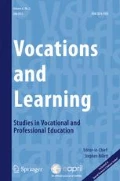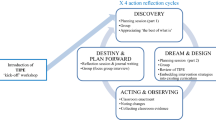Abstract
A lack of alignment between professional practice and education has triggered the move to alternative educational models, often with detailed scripts and templates to be followed. Among these are variants of problem/case-based models, where learners are challenged to achieve professionally desired learning outcomes and acquire knowledge and skills in their respective disciplines by encountering real-life situations as the stimulus and focus of their learning activities. A characteristic of these diverse models is that their scripts have been based on theories and understandings of what constitutes good learning and teaching in general. This article reports on a study conducted among law students that uses a script which focuses on the core ‘know-how’ of the legal profession. To examine the merits of this approach with respect to actionable knowledge, we employ perspectives from Knorr Cetina’s practice-theoretical lens. Particular attention is paid to how students are introduced to and learn the three archetypes of epistemic practices that Knorr Cetina identifies as central for members of expert cultures. The results from the study not only show that these practices were developed but also detail what is important in this respect. Thus, the article addresses calls in this journal for more research on how connections between school and work for professionals can be enhanced.
Similar content being viewed by others
Notes
Shulman characterizes professional education more generally as a synthesis of three apprenticeships. The third being a moral apprenticeship; i.e.to think and act in a responsible and ethical manner.
The term “script”, borrowed from science and technology studies (STS), designates the vision of what and the program of action a technology is supposed to accomplish (Akrich and Latour 1992)
References
Akkerman, S. F., & Bakker, A. (2012). Crossing boundaries between school and work during apprenticeships. Vocations and Learning, 5, 153–173.
Akrich, M., & Latour, B. (1992). A summary of a convenient vocabulary for the semiotics of human and nonhuman assemblies. In W. E. Bijker & J. Law (Eds.), Shaping technology/building society: Studies in sociotechnical change (pp. 259–264). Cambridge: The MIT Press.
Barrows, H. S. (1986). A taxonomy of problem-based learning methods. Medical Education, 20, 481–486.
Billett, S. (2001). Learning in the workplace: Strategies for effective practice. Sydney: Allen & Unwin.
Billett, S. (2010). Vocational learning: Contributions of workplaces and educational institutes. In R. Maclean & D. Wilson (Eds.), International handbook of education for the changing world of work: Bridging academic and vocational learning (pp. 1711–1723). Bonn: Springer Science.
Billett, S., & Choy, S. (2013). Learning through work: Emerging perspectives and new challenges. Journal of Workplace Learning, 25(4), 264–276.
Boud, D., & Feletti, G. (Eds.). (1997). The challenge of problem based learning (2nd ed.). London: Kogan Page.
Damşa, C. I., Nerland, M., & Jensen, K. (2017). Enrolment of higher education students inknowledge domains - an analysis of transformative practices in three introductory courses. In E. Kyndt, V. Donche, K. Trigwell, & S. Lindblom-Yllane (Eds.), Higher EducationTransitions: Theory and research. London: Routledge - Taylor & Francis group.
Guile, D., & Griffith, T. (2001). Learning through work experience. Journal of Education and Work, 14(1), 113–131.
Hmelo-Silver, C. E., & DeSimone, C. (2013). Problem-based learning: An instructional model of collaborative learning. In C. E. Hmelo-Silver, C. A. Chinn, C. K. K. Chan, & A. O’Donnell (Eds.), The international handbook of collaborative learning (pp. 370–385). New York: Routledge.
Hmelo-Silver, C., Duncan, R., & Chinn, C. (2007). Scaffolding and achievement in problem-based and inquiry learning: A response to Kirschner, Sweller, and Clark (2006). Educational Psychologist, 42(2), 99–107.
Hoidn, S., & Kärkkäinen, K. (2014). Promoting skills for innovation in higher education: A literature review on the effectiveness of problem-based learning and of teaching. OECD Education Working Papers, No. 100, OECD Publishing.
Knorr Cetina, K. (1999). Epistemic cultures: How the sciences make knowledge. Cambridge: Harvard University Press.
Knorr‐Cetina, K. (2001). Objectual practice. In T. Schatzki, K. Knorr‐Cetina, & E. von Savigny (Eds.), The practice turn in contemporary theory (pp. 175–188). London and New York: Routledge.
Knorr Cetina, K., & Reichmann, W. (2016). Professional epistemic cultures. In I. Langemeyer, M. Fischer, & M. Pfadenhauer (Eds.), Epistemic and learning cultures - woher und wohin sich Universitäten entwickeln (pp. 18–33). Weinheim: Juventa Verlag.
Latour, B. (1983). Give me a laboratory and I will raise the world. In K. Knorr Cetina & M. Mulkay (Eds.), Science observed: Perspectives on the social study of science (pp. 140–170). London and Beverly Hills: Sage.
Latour, B. (2010). The Making of Law: An Ethnography of the Conseil d’Etat. Paris: Polity Press.
Loyens, S. M. M., & Rikers, R. M. J. P. (2011). Instruction based on inquiry. In R. E. Mayer & P. A. Alexander (Eds.), Handbook of research on learning and instruction (pp. 361–381). New York: Routledge.
Markham, T. (2011). Project based learning. Teacher Librarian, 39(2), 38–42.
Newman, M. (2003). Special Report 2: A pilot systematic review and meta-analysis on the effectiveness of Problem Based Learning. ITSN Learning and Teaching Support Network. Middlesex University, UK.
O’Mahony, T. K., Vye, N. J., Bransford, J. D., Sanders, E. A., Stevens, R., Stephens, R., et al. (2012). A comparison of lecture-based and challenge-based learning in a workplace setting: Course designs, patterns of interactivity, and learning outcomes. The Journal of the Learning Sciences, 21, 182–206.
Pels, D. (2000). The intellectual as stranger. Studies in spokespersonship. London & New York: Routledge.
Schmidt, H. G., Rotgans, J. I., & Yew, E. H. J. (2011). The process of problem-based learning: What works and why. Medical Education, 45(8), 792–806.
Schulman, L. S. (2005). Signature pedagogies in the professions. Dædalus, 134(3), 52–59.
Williams, S. M. (1992). Putting case-based instruction into context: Examples from legal and medical education. The Journal of the Learning Sciences, 2, 367–427.
Funding
This research was conducted as part of the project, Horizontal Governance and Learning Dynamics in Higher Education, funded by the Research Council of Norway under the FINNUT programme (2012–2016).
Author information
Authors and Affiliations
Corresponding author
Rights and permissions
About this article
Cite this article
Jensen, K., Strømsø, H.I. Problem-Based Learning: the Emergence of New Scripts and Roles for Teachers to Render Epistemic Practices Transparent. Vocations and Learning 12, 343–360 (2019). https://doi.org/10.1007/s12186-018-09215-8
Received:
Accepted:
Published:
Issue Date:
DOI: https://doi.org/10.1007/s12186-018-09215-8




